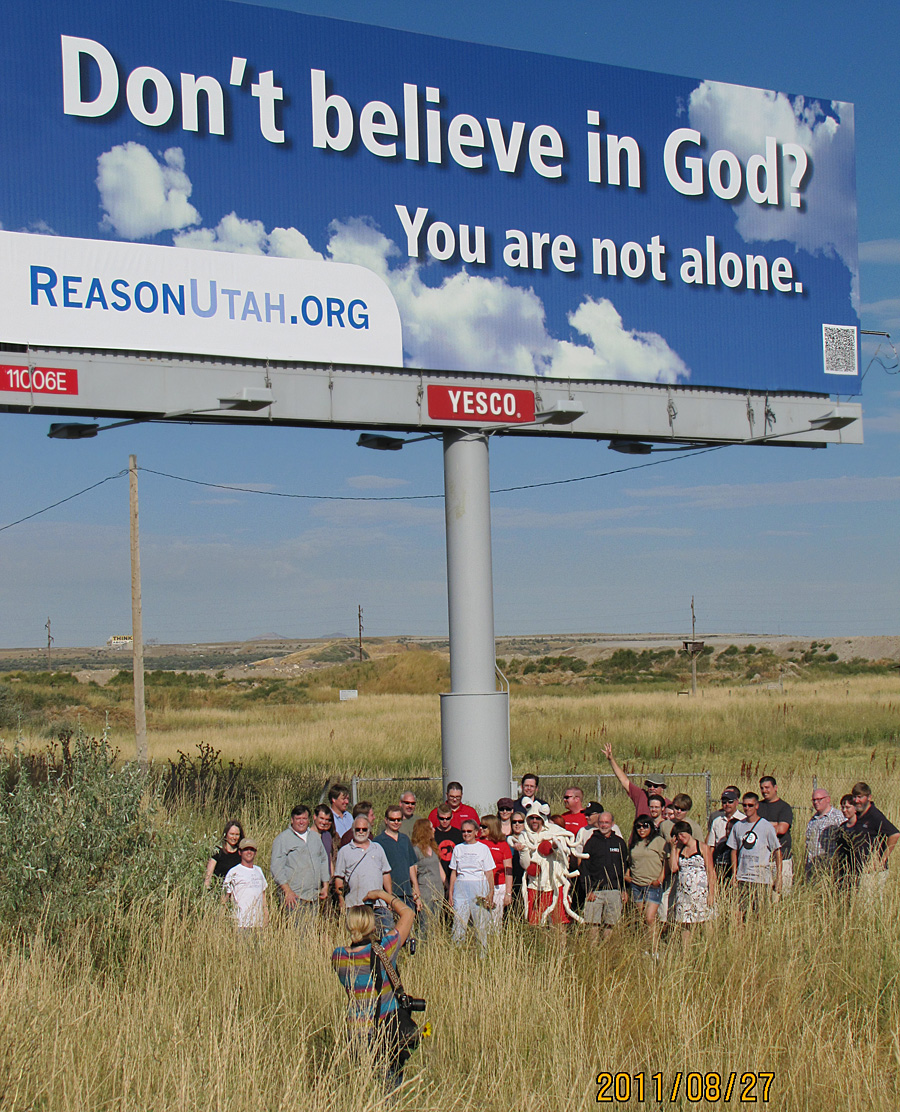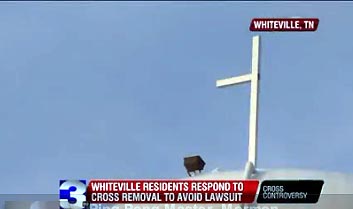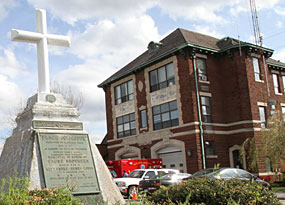|
Reload
SLVA
- Since 1972 Who we are... |
Salt
LakeValley
 theists... theists...
...the longest continuously sponsored atheist meetings in Utah |
| * All the News About the Utah Highway Patrol Cross Case | |
|
The Whiteville Cross: Mayor Calls Atheists
‘Terrorists’
In the State of Tennessee there is a little town called Whiteville. And in Whiteville there is a public tower, upon which rests the universal symbol for christianity: the Latin Cross. Until recently Whiteville was a quaint little town, but some resident in the town has had the audacity to come forward with the Freedom From Religion Foundation (FFRF) and told Mayor James Bellar that if the cross was not removed from the water tower that a legal suit would follow. But here is the thing: until now, Bellar has simply been ignoring the town resident and the FFRF.  The
first letter was sent to Bellar on December 8, 2010 (a
copy of the letter is available here. Two other
letters followed this, but Bellar had better things to
do. But now that the FFRF is threatening a legal suit
over the cross, Bellar has had to concede and take it
down…but he is doing so very grudgingly. And he has a
number of things to say about this ordeal. The
first letter was sent to Bellar on December 8, 2010 (a
copy of the letter is available here. Two other
letters followed this, but Bellar had better things to
do. But now that the FFRF is threatening a legal suit
over the cross, Bellar has had to concede and take it
down…but he is doing so very grudgingly. And he has a
number of things to say about this ordeal.The website for WREG News in Memphis, TN quotes Bellar a number of times discussing this issue. In Bellar’s eyes, Whiteville is a religious town and that he is sorry that “we have one individual here who is offended by this”. WREG also quotes: “As a matter of fact, I don’t even think it’s a Whiteville resident,” he said. “We don’t have people of that belief here and if we do they’re not going to raise that kind of ruckus for the rest of the town.” But wait, there’s more. A Radio.FoxNews.com blog article written by Todd Starnes, Bellar is quoted as saying: “They are terrorists as far as I’m concerned,” said Mayor James Bellar about the Freedom From Religion Foundation. “They are alleging that some Whiteville resident feels very, very intimidated by this cross.”
Now, I know what my learned
readers are thinking: ‘This asshat obviously doesn’t
know what terrorism means.’ Bellar was kind enough,
however, to provide us with an explanation of what he
means by the term ‘terrorism’. According to Bellar (WREG):
“A terrorist is more than a guy that flies the planes
into the building,” he said. “It’s anyone who can
disrupt your way of living, destroy your lifestyle,
cause you anxiety. It’s more than killing people. If
they can disrupt your routine in life, that’s what they
want to do. They are terrorists as far as I’m
concerned.”
In Bellar’s eyes, even disrupting someone’s routine in life can be considered an act of terrorism: now even the most mundane of activities, including asking that the law be enforced, can be considered an act of terrorism.Chew on that for a fucking minute. That is some scary shit! Good thing his ideas about what does and does not constitute terrorism have nothing to do with legal definition and practice. WREG also quotes who appears to be a town resident: “”I’d tell this one person who’s got a problem with it to go ahead and pack and move, and if anybody else has a problem with the cross they need to pack and move also,” said Larry Cook. But this
is not a case of someone asking for something outrageous
from their municipal government: this involves a town
resident asking his municipal government to enforce the
law; specifically the Establishment Clause, which is
summed up pretty well on
Wikipedia.
It was for these reasons that FFRF attorney Alvin Harris wrote to Mayor Bellar and informed him that unless the cross was removed from public land that the FFRF would sue the Town of Whiteville. He clearly informs the mayor of the illegality of having a religious symbol, like the Latin Cross, on public land. Harris also provided Bellar with a number of references to case law which testify to the tendency of the courts to rule against municipalities such as Whiteville. Bellar’s intention had been to challenge this in court, but the town does not have the financial means to do so. As a result, the cross is being taken down and placed on private property along a local highway. And according to WREG, with the cross on private land no one can remove it. He also believes that the cross will also be seen by many more people now. While this may have been a win both for the law and for freedom from religion, it is just another brazen example of some christians expecting the law to conform to their own ideas of right and wrong. The United States seems to be experiencing clashes across the board with respect to the law and religion, and most of these clashes are being led by christians. It also shows just how much contempt is present in some of these christians, like Bellar, who considers this challenge to his religion to be an act of terrorism.
Source:
PhilosophersHaze.com
|
|
|
FFRF
legal team busy defending Constitution FFRF alerted municipal officials in Somerville and Whiteville, Tenn., to constitutional violations of displaying Christian crosses on government property. In Dec. 8 letters, Senior Staff Attorney Rebecca Markert
reminded Somerville Mayor Bob Morris and Whiteville Mayor
James Bellar that “No court of final resort has ever upheld
the government’s permanent display of a Latin cross on
public land as constitutional. The inherent religious
significance of the Latin cross is undeniable and is not
disguisable.”
Source:
FFRF.org
|
|
|
The
Whiteville Cross: Village Amputates Latin Cross
|
|
|
FFRF Sues Feds over
Unconstitutional Tax Benefits for Christian Ministers
The atheistic
Freedom From Religion Foundation is picking a new battle —
this time over the housing exemptions that Christian
ministers are afforded by the federal government. The ministers‘ allowance isn’t just for rent or mortgage payments. Payment for everything from closing costs to home furnishings to utilities and lawn maintenance qualifies for exemption. Under
current IRS law, preachers are paid in tax-free dollars.
They are able to deduct mortgage interest and property tax
payments and their allowances are not treated as typical
taxable income. The laws governing these exemptions were
passed back in 1954. What makes
the housing allowance even more offensive to FFRF is that
housing payments for ministers preaching the Gospel also are
exempt from most states’ income tax.
This is not
the first time the group has attempted to tackle this issue.
The Post reports that the group voluntarily dismissed a
similar lawsuit back in June based out in Sacramento,
California. ... And the Legislature is NOT a governmental body (sic), so it's OK for it to decide if a Latin Cross is a religious symbol or not ~ ED. Source: TheBlaze.com |
|
|
Links Tax the Churches Atheist Brunch Hitchens on Masturbation - Islam style Off-site Links American Atheists - Hitchens Interview Christopher Hitchens - Wikipedia |
|
  |
|
 |
|

Salt Lake City's atheists congregate near a highway sign in 2011.

 Remember
the controversial cross on a water tower in Whiteville,
Tennessee? Earlier this month, the Blaze reported that Mayor
James Bellar was planning to cave to atheists’ demands and
have the religious symbol moved to private land.
Remember
the controversial cross on a water tower in Whiteville,
Tennessee? Earlier this month, the Blaze reported that Mayor
James Bellar was planning to cave to atheists’ demands and
have the religious symbol moved to private land.
 John
Witte, director of the
John
Witte, director of the


